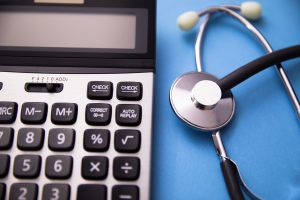Meet the lawyers we work with:Tracy Chick
Expert in Road Traffic Accident law and Personal Injury Claims.

Last Updated 04/07/2025
Welcome to our medical misdiagnosis compensation calculator guide. If a medical professional has misdiagnosed you, and this has led you to suffer harm that should’ve been avoided (known as ‘avoidable harm’), you could be entitled to claim compensation.
In this guide, we first tell you how medical misdiagnosis compensation is calculated. You will also learn about the eligibility criteria you need to meet to be able to make a medical negligence claim.
Then, we discuss how you should go about making a claim, from what evidence you should gather to how long you have to start claiming compensation. We end this guide by discussing what our panel of No Win No Fee solicitors can do to help you throughout the claims process.
Misdiagnosis Compensation Calculator
We rely on medical professionals to help us when we’re in need. However, mistakes can sometimes happen, unfortunately. If you are suffering because you were misdiagnosed, we want to help you today. Please contact us today by using one of our free contact methods, and have a chat with one of our advisors about your circumstances:
- Call 0800 408 7826.
- Fill out our online ‘contact us’ form.
- Send us a message in our on-screen live chat box.
Jump To A Section
- Medical Misdiagnosis Compensation Calculator
- Could You Be Eligible To Make A Medical Misdiagnosis Claim?
- How To Make A Medical Negligence Claim
- Why Trust Our Panel Of Solicitors With Your Medical Misdiagnosis Claim?
- More Information
- Frequently Asked Questions On Claiming For Misdiagnosis
Medical Misdiagnosis Compensation Calculator
You can access our online misdiagnosis compensation calculator here, where you can input your details and receive an estimated medical negligence compensation figure. However, it may be more beneficial for you to learn how medical negligence compensation is calculated.
If you have a successful misdiagnosis claim, your medical negligence compensation may be split into two parts – general and special damages.
General damages compensate you for how you’ve been physically and psychologically affected unnecessarily by medical negligence. Under special damages, you can claim for any financial losses arising from that unavoidable harm.
Here are a few different factors that can determine the value of your general damages:
- Loss of amenity.
- How painful your avoidable harm is.
- Your prognosis.
You could be asked to attend an independent medical assessment during the misdiagnosis claims process for your harm. Legal professionals can refer to the Judicial College Guidelines (JCG), alongside the reports from this assessment, to help them calculate compensation for your general damages. The JCG publishes suggested compensation brackets for different types of physical and psychological harm.
Medical Misdiagnosis Claim
How do I know if I can make a medical misdiagnosis claim?
To make a medical diagnosis claim, you need to be able to prove that you were harmed in some way, and that your healthcare provider was at fault. We can help by gathering evidence and supporting your misdiagnosis claim.
Generally, you can make a misdiagnosis compensation claim if:
- You saw your doctor with symptoms and were told there was nothing wrong – only for you to be diagnosed later on.
- You were told your condition was much less serious, which resulted in delayed treatment.
- You had unnecessary treatment or surgery for a wrong diagnosis.
- You’ve been wrongly told that you had a terminal illness, which led to psychological harm.
No matter what the impact, we understand how terrifying medical misdiagnoses can be, and offer 10 years’ experience in settling claims just like yours.
Calculate your compensation nowGuideline Misdiagnosis Compensation Table
In the table below, we have highlighted some types of harm outlined by the JCG. We have also included their accompanying guideline compensation bracket (except for the top figure, which isn’t from the document).
Please keep in mind that this table is for guidance only. All medical negligence claims are different, so no amount of compensation can be guaranteed for any particular case.
| Harm | Severity | Guideline compensation | Notes |
|---|---|---|---|
| Multiple very severe types of harm and special damages | Very severe | Up to £1,000,000+ | Compensation for suffering multiple very severe types of harm and monetary losses such as domestic care costs. |
| Brain damage | Very severe | £344,150 to £493,000 | In this bracket, compensation may be influenced by considerations like degree of physical limitation, impairment of senses, and the ability to communicate (with/without assistive technology). |
| Moderate (iii) | £52,550 to £110,720 | Memory and concentration are affected, and the ability to work is reduced. | |
| Bladder | Double incontinence (a) | Up to £224,790 | Total loss of function and control to the bowels and bladder. |
| Seriously impaired control | £78,080 to £97,540 | With some pain and incontinence. | |
| Chest | Loss of a lung and/or serious heart damage (a) | £122,850 to £183,190 | With permanent scarring that is significant, and prolonged and serious pain. |
| Damage to chest and lungs (c) | £38,210 to £66,920 | Causing some ongoing disability. | |
| Psychiatric damage | Severe (a) | £66,920 to £141,240 | A very poor prognosis, where all aspects of life have marked problems. Factors considered can include impact on relations, such as with family, as well as claimant's ability to cope with work. |
| Moderate (c) | £7,150 to £23,270 | A good prognosis because there would've been a marked improvement by trial. There may have been problems seen in the above bracket, such as the claimant's ability to cope with life being affected. | |
| Kidney | Loss of kidney (c) | £37,550 to £54,760 | The kidney will have been lost without any damage to the other. |
Calculating Special Damages In Your Claim
Special damages compensate you for how you’ve been financially affected by medical negligence.
Some financial losses you could potentially incur as a result of your avoidable harm include:
- Loss of earnings for you requiring time off work to recover.
- Professional and domestic care costs.
- Travel expenses to attend medical appointments.
You must provide evidence of your financial losses in order to include any losses under special damages. As such, be sure to retain any bank statements, receipts, invoices, and payslips that can support your claim.
Please contact our advisory team to find out more about our misdiagnosis compensation calculator and how medical negligence claims are calculated.
Could You Be Eligible To Make A Medical Misdiagnosis Claim?
You could be eligible to make a medical misdiagnosis claim if you can show that medical negligence has occurred. Medical negligence is when you suffer avoidable harm because a medical professional breached their duty of care towards you.
All medical professionals owe their patients a duty of care. This means that they must always provide the correct standard of care to every patient they treat. Thus, it is a breach of duty of care to provide a standard of care that doesn’t meet what is minimally expected from them.
As such, here are the medical negligence claims eligibility criteria:
- A medical professional owed you a duty of care as one of their patients.
- They breached their duty of care by providing substandard care.
- You suffered avoidable harm as a result of this breach of duty.
Not all cases of misdiagnosis would lead to an eligible medical negligence claim. For example, the correct standard of care may have been given, but you are still misdiagnosed because your symptoms are irregular to the condition’s usual symptoms.
Please speak to our advisors today about starting a medical negligence claim if you believe you meet the above eligibility requirements. Below, we go through some examples of how a medical professional could potentially provide substandard care and cause avoidable harm.
How Could A Misdiagnosis Occur?
Here are some examples of how a medical misdiagnosis could potentially occur, leading to an eligible compensation claim:
- You visit your GP because you have common symptoms of bladder cancer (blood in urine, unintentional weight loss, etc.). However, your GP fails to listen to your concerns and doesn’t send you for further testing. Your misdiagnosed cancer progresses as a result, meaning you need more invasive treatment.
- A doctor in a hospital misinterprets your scan image results where another medical professional wouldn’t have. The doctor thus diagnoses you with a sprain instead of a broken ankle. Mistaking a broken ankle for a sprain could result in the foot not healing properly, leading to long-term consequences.
- During a routine check when you’re pregnant, the midwife fails to spot the signs of pre-eclampsia, which should be easily diagnosed. This missed diagnosis causes complications, which leads to your baby being ill.
- Your GP mixes up your test results for another patient’s due to mislabelling. You are thus misdiagnosed with bronchitis when you, in fact, have lung cancer. The missed diagnosis could affect the chances of a full recovery being made.
- You show clear signs of having a stroke. However, when you go to A&E, your doctor dismisses you as having a headache and refuses to order any further tests. This stroke misdiagnosis results in permnanent brain damage.
These are just a few examples. Medical misdiagnosis could potentially occur in more ways, so please don’t fret if your circumstances haven’t been listed above. We always recommend you speak directly with one of our advisors about your specific situation and how best to use a misdiagnosis compensation calculator.
How To Make A Medical Negligence Claim
Before contacting us to find out whether you have an eligible medical negligence claim for misdiagnosis, you should seek medical attention regarding your avoidable harm. Your medical notes and records can then be used as evidence.
Then you should contact us to confirm whether you have an eligible medical negligence claim for misdiagnosis. If you are eligible for compensation, our advisors can then connect you with a specialist solicitor from our panel. They can get the claims process started for you.
Gathering Evidence To Back Up Your Claim
A part of the claims process includes providing evidence that shows how medical negligence has occurred.
As such, after suffering from a misdiagnosis, you should try and gather:
- Copies of your medical records and notes, including copies of test results and examination notes. This can show what date you first sought treatment for your symptoms, how the correct standard of care wasn’t met, and the extent of your avoidable harm.
- Copies of correspondence (such as emails and letters) relating to any medical appointments you attended.
- Copies of any complaints you made against the healthcare provider.
- Photographs of the visible effects of your avoidable harm.
- Contact details from anyone who was there to witness the substandard care provided by the negligent medical professional. This can include a loved one who attended your appointment with you or another staff member.
- A personal symptoms and treatments diary with dates.
The thought of collecting all of this evidence on your own can seem daunting. If you are connected with a solicitor from our panel, they can help you collect the evidence that’s needed.
Time Limits For Making A Claim
If you want to start a claim, you must do so within 3 years of either the date medical negligence occurred or the date you became aware of it, as per the Limitation Act 1980.
However, this time limit is paused for claimants who cannot make their own claim. For example, if the claimant is:
- Lacking their mental capacity. For example, if they’ve suffered brain damage from an anaphylactic shock as a result of the misdiagnosis.
- Under the age of 18.
The time limit will commence when the claimant either:
- Recovers their full mental capacity (the time limit will run from the date of recovery).
- Turns 18 years old (the time limit will run from the date of their 18th birthday).
In these cases, while the time limit is paused, a litigation friend may be able to make a claim on an individual’s behalf before the time limit commences again.
If you want to make a medical misdiagnosis claim for someone else, such as your child, please get in touch today for more information.
Why Trust Our Panel Of Solicitors With Your Medical Misdiagnosis Claim?
You can trust our panel of solicitors to help you with your medical misdiagnosis claim because they have many years of experience in this legal field, and can offer a range of services to make the process as simple for you as possible.
If you have an eligible claim, a medical negligence solicitor from our panel can do the following for you:
- Gather all evidence.
- Send correspondence to the defendant on your behalf.
- Confirm that your claim is filed within the time limit.
- Ensure the medical negligence compensation calculator is accurate.
- Update you regularly on the progress of the claim.
- Explain legal jargon.
What’s more, these services are offered under a Conditional Fee Agreement (CFA), which is a No Win No Fee type of arrangement.
That means that you don’t pay solicitor fees for your representative’s services:
- Upfront.
- Ongoing during the claims process.
- If the claim ends up losing.
If you win your medical negligence claim, your solicitor will just take a success fee from your compensation. This fee is a percentage, which is always capped at 25%.
So, to see whether you can receive this help from our panel or for advice on how to use our misdiagnosis compensation calculator, please contact our advisors today about starting a medical misdiagnosis claim. They can give you free advice on what you can do next:
- Call 0800 408 7826.
- Fill out our online ‘contact us’ form.
- Send us a message in our on-screen live chat box.
More Information
View some of our other medical negligence compensation claim guides here:
- Learn how to use our compensation calculator for death if a loved one has passed away.
- Find out how to make a sepsis medical negligence claim.
- Learn how to make a blood clot medical negligence claim.
Additionally, you might find these pages helpful:
- General Medical Council (GMC) – find out what good medical practice is expected from doctors.
- Royal College of Nursing (RCN) – find out what duty of care is expected from nurses.
- Gov.UK – find out how to claim Statutory Sick Pay (SSP) if you’re missing work to recover from your misdiagnosis.
Frequently Asked Questions On Claiming For Misdiagnosis
Read this section to answer some frequently asked questions that are associated with claiming for misdiagnosis, including the use of a misdiagnosis claim calculator.
What Is The Average Payout For Misdiagnosis?
The average payout for misdiagnosis, according to NHS Resolution, was around £98,258 between 2023 and 2024, but you can contact an advisor today to find out how to use our misdiagnosis compensation calculator for more tailored insight.
Can I Sue My Doctor For Misdiagnosis In The UK?
Yes, you can see your doctor for misdiagnosis in the UK if you can prove that you suffered unnecessary harm due to their failure to treat you in line with the minimum standard of care expected of all medical professionals.
What Happens If You Misdiagnose A Patient?
If a patient is misdiagnosed, resulting in otherwise avoidable harm, there may be a case for claiming misdiagnosis compensation.
What Is A Possible Consequence Of A Misdiagnosis?
A possible consequence of a misdiagnosis is invasive or incorrect treatment, such as chemotherapy being administered when you are wrongly diagnosed with cancer.
Thank you for checking out our medical misdiagnosis compensation calculator guide.






